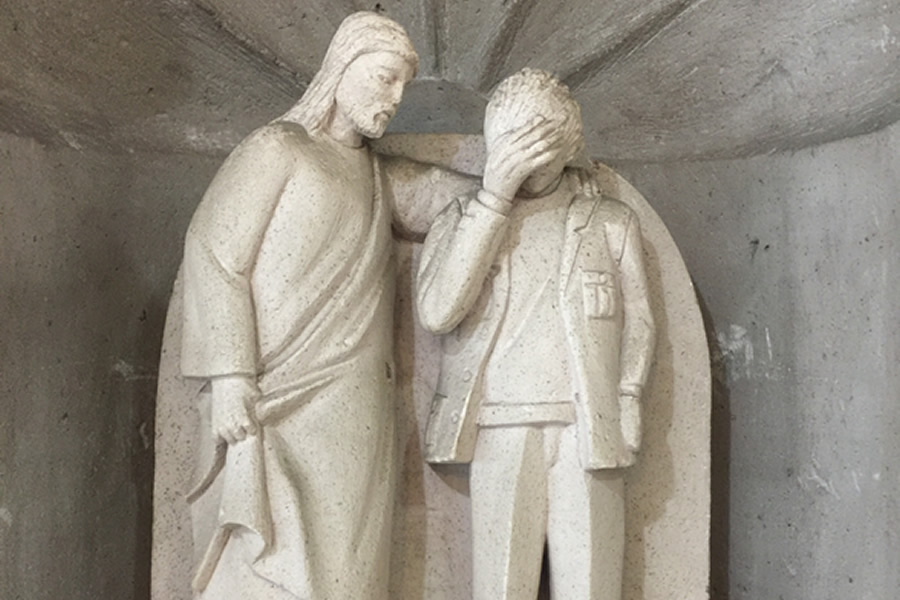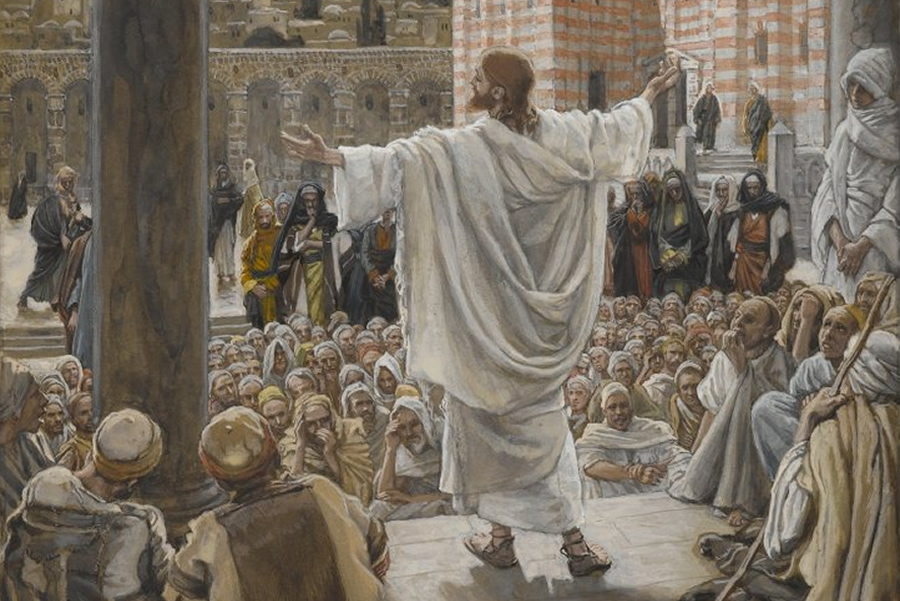
Love and Kindness
09-29-2019Weekly ReflectionFather Prince RajaThe gospel text of today invites us once again to reflect on the meaning of love and kindness. There is the unnamed rich man who has a poor neighbour named Lazarus. 'Lazarus' literally means, 'God helps'. The poor man is very visible because he lies at the gate of the rich man. Lazarus yearns for the love of his neighbour, which he does not receive. He relies solely on the love of God. The parable should not be taken to justify laziness or to discourage hard work. There is no reference to both in the text. There is no glorification of material poverty either. The text is about our attitude to God, and our attitude towards our neighbour. So, does the gospel answer our initial question: Why love? I think, the gospel text of today teaches us that love and kindness are important for our lasting well-being and true happiness. Three things seem to emerge from the text:
READ MORE
Providing for Our Spiritual Well-Being
09-22-2019Weekly ReflectionFather Prince RajaIn our gospel, we may be left a bit confused. It sounds as if our Lord is speaking in a somewhat approving way of the dishonest steward. The steward may have squandered his master's property, enriched himself at this master's expense, or he may simply have been incompetent. Our Lord doesn't' give us the details as to why he lost his job. Even if he was incompetent, he was bright enough to provide for his future.
Before he left his position, he called in all the people who owed his master money and reduced the size of their debt. Then they would be indebted to him. Commentators suggest perhaps he was eliminating any commission that would have been due to him. Whatever was behind all of this, his dishonesty was not grand larceny or he would have been worried about jail rather than being worried about digging or begging.
Your title here...
READ MORE
Lost and Found
09-15-2019Weekly ReflectionFather Prince RajaIn this Gospel passage of today Luke has put together three parables all stressing the dynamic of lost and found. The point the evangelist is making in each case is the generous willingness God demonstrates in accepting back the repentant sinner. In the first parable the repentant sinner is symbolized in the lost sheep. The second parable focuses on the lost coin. The third parable presents a younger son and an elder son both of whom are lost. Luke makes it clear in each case, whether the man or the woman or the father, who assertively go after what is lost until found.
READ MORE
The Economy of Salvation
09-08-2019Weekly ReflectionFather Prince RajaThe liturgical tradition of the Church places a lot of importance on dedication of churches. For instance, when it is the anniversary of the dedication of a Cathedral church (the principal church of the diocese which has the chair of the Bishop), it can be celebrated as a solemnity on a Sunday. The Basilica of St John Lateran is the cathedral church of the Diocese of Rome – the mother of all churches. Why do we celebrate the dedication of a church? In the Catholic tradition, the church building is not just a hall for fellowship. It is a sacred space. It is the abode of God, where the presence of God is made very tangible by the presence of the Eucharist. The church is the focus point of the believing community – the Body of Christ. Symbolically the church itself is the body of Christ. This weekend we have our Immaculate Conception church altar is rededicated and fall festival is celebrated, thanks to all your generous contribution towards this event. I am glad it's happening on a special day September 8, the Nativity of Blessed Mother Mary.
READ MORE
Eucharistic Adoration
08-18-2019Weekly ReflectionDeacon Edward WendtDear Families,
I was praying about this the other day. You know what our parishes need? We need to spend more time in Eucharistic Adoration.
Eucharistic Adoration is the presence of oneself with our Lord Jesus Christ in the Blessed Sacrament, whether reposed inside the tabernacle, or exposed inside a monstrance.
Adoration allows for personal time to be spent with the real physical presence of Jesus Christ contained in the Eucharist. This is usually done within a period of one hour or otherwise referred to as a "Holy Hour." Privately one can pray in silent prayer, give praise to God for all His works and grace, and to absorb the peaceful presence of the Lord in our busy, noisy, and sometimes turbulent lives.
READ MORE
Parish Liturgy Committee
08-11-2019Weekly ReflectionDeacon Edward WendtMy Dear Tres Ecclesiae families,
Father Prince and I have spoken numerous times about the development of liturgy committees at our three churches. These individual committees will serve an all important role to enhance the present liturgical celebrations at their particular parish.
Some years ago, then Cardinal Ratzinger –now Pope Emeritus Benedict XVI— said: "The Church stands or falls with the liturgy". There is nothing more important than the liturgy, in which we encounter God himself." This is true for the Church as a whole, and for each member and group within the Church. This is true, as well, for each parish. For us too, the liturgy is the source and summit of our life. Why? Because although there are many ways of doing good things and even of praying, only in the liturgy of the Church do we receive God's grace through the sacraments; only in the liturgy do we encounter God personally, in a real and efficacious way.
READ MORE
Ask, Seek, Knock
07-28-2019Weekly ReflectionFather Prince RajaLet's welcome Fr. Emmanuel Bekoe to our parishes this weekend, as he is doing Mission appeal in our parishes, I will be doing the weekend masses of St. Patrick parish Onalaska. After that I will be making my pilgrimage of Camino de Santiago in Spain, as we celebrated the feast day of St. James the Apostle on July 25, I will keep you all in my prayers during my pilgrimage in Spain and France. I really appreciate and thank Fr. Kyle & Fr. Biju who will be filling in for me during the four weekends, thanks to our Deacon Edward Wendt who will do communion service during weekdays.
READ MORE
Generosity given in Hospitality
07-21-2019Weekly ReflectionFather Prince RajaServing those in need and providing hospitality is considered an important Christian virtue. The readings of today reveal the unique insight of generosity given in hospitality that finds its fulfillment. Hence the central theme of today's Mass is hospitality where a person seeks to discover the divine presence in the other. In general, welcoming a guest was and still is an extremely important obligation of people living in the world. In the Gospel we have Martha, Mary and Lazarus welcoming Jesus to their house and show their hospitality. However, the Lord indicates that such hospitality should be without any anxiety but filled with service and love. The first and the third readings of today are set within the context of ancient near eastern customs of hospitality.
READ MORE
The Parable of the Good Samaritan
07-14-2019Weekly ReflectionFather Prince RajaThere are many parables that are unique to the Gospel of Luke. The parable of the lost son (Lk 15:11-32), the parable of Lazarus (Lk 16:19-31), the parable of the Pharisee and the Publican (Lk 18:10-14) are among those that are unique to the gospel of Luke. The parable of the Good Samaritan, that we hear read in the gospel text of today, is also one of them. To get the real message of Jesus in the unique parables of Luke we need to pay attention to the final twist to the story.
READ MORE
Fourteenth Sunday in Ordinary Time
07-07-2019Weekly ReflectionFather Prince RajaThe Church, as explained by the Second Vatican Council, is by her very nature missionary, since according to the plan of the Father, she has her origin in the mission of the Son and the Holy Spirit. The Gospel of today tells us that Jesus summoned his seventy committed people and sent them two by two to communicate God’s love, to bind up wounds and to be peace makers in a troubled world. The gospel passage describes Jesus sending seventy men for a mission, a wider mission. The number seventy was to the Jews symbolic:
First, it was the number of the elders who were chosen to help Moses with the task of leading and directing the people in the wilderness (Num 11:16-17, 24, 25).
READ MORE